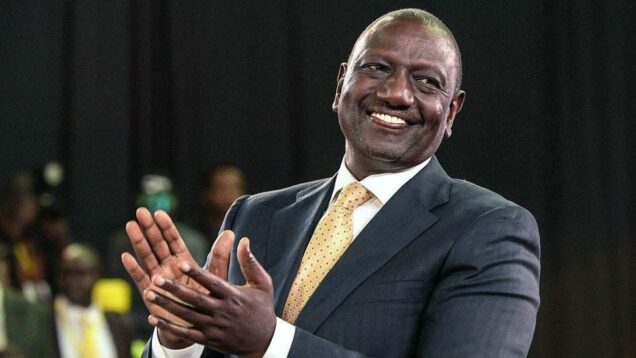William Ruto was Monday, August 15, declared the victor of a hard-fought presidential poll in Kenya, but the outcome sparked a split in the election commission and some violent protests in his defeated rival’s strongholds.
Ruto won with 50.49 percent of the vote on August 9, narrowly ahead of Raila Odinga on 48.85 percent, Independent Electoral and Boundaries Commission chairman Wafula Chebukati announced after an anxious days-long wait for results in Kenya.
Read Also: Orji Uzor Kalu Reprimands Nigerian Youths Trolling Adults (Video)
With tensions running high after the disputed outcome, the 55-year-old president-elect vowed to work with “all leaders”.
Ruto said;
There is no room for vengeance. I am acutely aware that our country is at a stage where we need all hands on deck.
AFP correspondents reported that police fired live rounds as protests erupted in a Nairobi slum that is an Odinga stronghold.
Police also fired tear gas in his lakeside bastion of Kisumu where demonstrators threw stones and erected roadblocks with large chunks of rock.
The dispute is likely to further damage the reputation of the IEBC after it had faced stinging criticism over its handling of the 2017 election which was annulled by the country’s top court in a historic first for Africa.
Allegations Of Intimidation And Harrassment
Four out of seven IEBC commissioners rejected the outcome of Tuesday’s vote, with vice chair Juliana Cherera describing the process as “opaque”.
But Chebukati, who was also in charge of the IEBC in 2017, insisted he had carried out his duties according to the law of the land despite facing “intimidation and harassment”.
The dispute will test the electoral stability of Kenya after previous elections in the East African political and economic powerhouse were blighted by claims of rigging and vicious bouts of deadly violence.
The country of about 50 million people is already struggling with soaring prices, a crippling drought, endemic corruption and growing disenchantment with the political elite.
It was first time lucky for the incumbent deputy president, a shadowy rags-to-riches businessman who had characterised the vote as a battle between ordinary “hustlers” and the “dynasties” who have dominated Kenya since independence from Britain in 1963.

